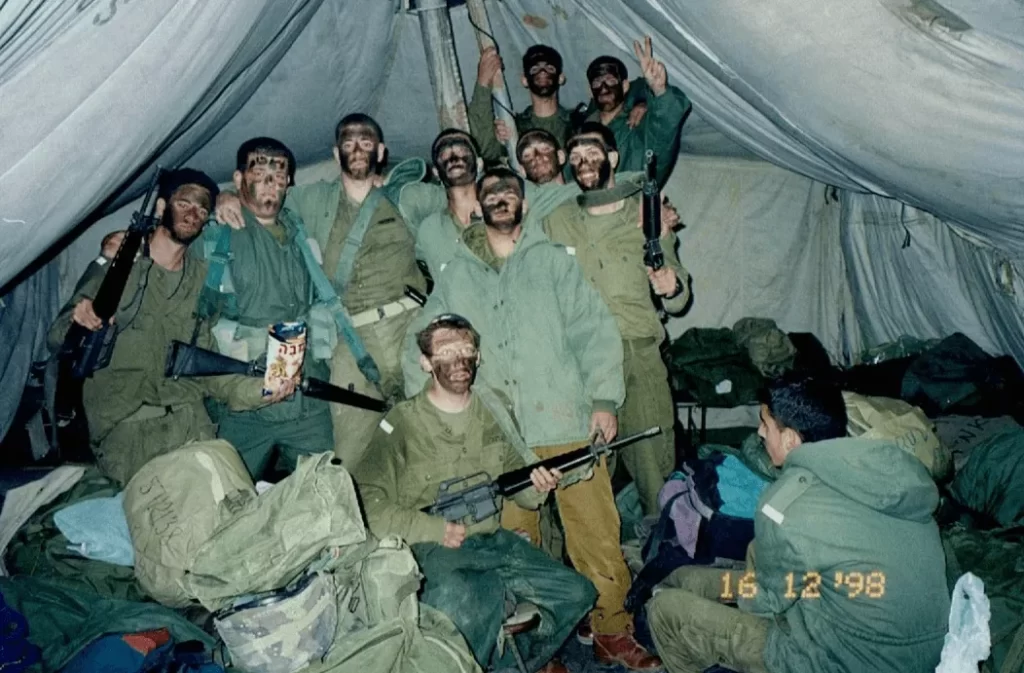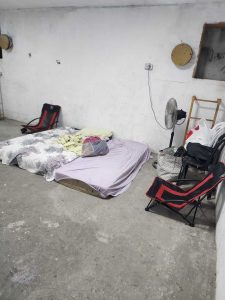I am eighteen. Parent drop-off at the army induction center. Civilian clothes. Everyone around me is in the same situation as me, because in Israel there is compulsory conscription for all men and women, at the age of eighteen. Hugs from parents. Names are called; it takes about two hours to go through the induction process – and there I am, in uniform. Proud, yet unaware of what is to come. I spend the night with all the other new soldiers in the induction center base. Morning, second day in the army, we are bussed out to our unit’s training base, where I am going to spend the next six months turning into a full-fledged Israel Defense Forces (IDF) soldier.
Nahal, infantry unit. Eleven beds in a large tent, all my belongings in two big bags, one I brought from home with all my personal civilian belongings, the second a kitbag (duffel bag), with all the Army equipment I was issued. During the day, the bags are piled on top of the bed in a neat and orderly manner, and at night they go under my bed, making room for me in my sleeping bag.
Tent-mates, they will become my comrades-in-arms. They will cover my ass in combat, but for now, they are strangers, and together we are trying to figure out this Army thing. My tent is my squadron, one of three that make up our platoon. Platoon number one, out of the three that make up our company. In my tent, 11 soldiers, or to be more precise, civilians in uniform. The guy occupying the bed next to me is from a kibbutz in the north, a secular ideological kibbutz. We begin to talk and very quickly it becomes clear he is the total opposite of me.
On my other side, was what is known in Israel as the classic “Tel Avivian”. Well he wasn’t exactly from Tel Aviv but from a suburb just north of the city, Rishphon to be exact, but we all dubbed him the Tel Avivian– for that was exactly what he was, he was from an ‘elite’ family of the old time Ashkenazi hegemony. Then there was the fellow from a Sephardic family. His grandparents came to Israel from Morocco in the late 1950’s, were sent to a small town in the south, on the Gaza border, a place known in Israel as a Development Town, and ever since he was born there, he hadn’t left the city. Then there was the Druze soldier, from a village in the Galilee. I had learned about the Druze, but this will be my first real and intense encounter with a member of the community. Actually, this will be my first real encounter with the diversity of Israeli society. Looking back, I do not think any of us had really experienced this until we were thrown together in that tent. Even today, I still have very fond memories of my tent mates, and the experiences we shared.
Basic training begins. Physical fitness, discipline, professional and educational training. You soon get the hang of it, and start counting: one month to swearing-in ceremony, four months to beret-qualifying march, six months until we become combat operational, three years until discharge from active duty, twenty years until the army will officially release me for good and discharge me from reserve duty. It all starts here at Basic Training. The Sergeant, whose name we do not know is giving the orders. The officer, whose name we do not know either, appears in and out, establishing chain of command.
You get the hang of it. You run when you are told to, and that is all the time. Eat quickly, shooting range, all-terrain marching, classes, day after day, over and over again. You quickly learn to catch a nap every free moment you have, and even when you don’t have it. That is when the trouble starts: that moment when you are on guard duty and you wake up to your commander’s shout, “Spivack!”, and the rhetorical question “Are you sleeping on duty?”, and then comes the warning, “Remember this…”. Yet you are always caught by surprise when you hear your name attached to the rebuke “remember”, or “expect a hit”. These reprimands come when you Fuck Up. Yes ״Fuck-Up,” that is what they call it. When you are late, out of line, not organized, not following orders, forget your gun, and a million other things you are not to do as a raw soldier.
Yep, in basic training everyone “Fucks Up”. But not everyone is caught. So, when your name is shouted with the “remember this.” or “expect a hit” you know you Fucked Up, and you will pay for it.
Some Fuck-Ups are minor and carry a minor punishment, like meeting the commander or Sergeant in the evening after hours behind the barrack for some extra running and pushups, with a lot of “Yes, Sir”, ‘I understand, Sir”, “I will not be late, Sir” and all sorts of other promises to your commander, like to be organized, and watch yourself not to step out of line again. Except for receiving a physical punishment, or being docked some free time, it isn’t all that bad.
The serious Fuck-Ups wait for the end of the week, for their special moment at the Company fuck-up rollcall.
At the end of the week, Thursday night, before a long-awaited weekend at home, we the platoon gather. Sitting in the tent. Our officer enters – we stand to attention, he orders, “At ease!”, and we sit. “David- what did you do this week?”, the officer challenges. David jumps to attention: “I left my gun in the tent while I was in the shower- Platoon Commander”. “Is that all? the officer demands? “Yes! Platoon Commander”. “Two hours – you may sit”. “Matan- what did you do this week?”. “I spoke up to the Sergeant…and fell asleep on guard….and was late to morning roll call! Pluton Commander”. “Four hours- you are almost at your limit, watch yourself next week, or it will be worse”. This goes on, soldier after soldier, for as I have already mentioned, everyone fucks-up. Well, almost everyone; there is always the guy that seems to always get it right. We are almost at the end. “Amir- what did you do this week?” Amir knows he is in for trouble; he has violated every possible order this week. After a brief back and forth, the platoon commander orders “Shabbat- sit down”. We all know what this means: tomorrow when we leave base to spend the weekend at home, Amir will stay on base, doing guard duty and other assignments. It will only be two weeks later that he will be able to go home, altogether a month that he will not sleep in his cozy bed, eating Mom’s food.
The next morning, after an early wakeup, cleaning and setting our tent in order, we shower, put on our Madi Aleph (dress uniform), polish our boots and are standing in a U- formation in the platoon yard. We are called to attention and the Sergeant enters, stands in front. We are all excited, except Amir, who is standing amongst us in his Madi Bet (field uniform). The Sergeant calls out the list of rules and regulations on how we must comport ourselves while off base: that we are representing the IDF and the State of Israel and that our uniform must be neat and orderly at all times. We must use only public transportation, no hitch hiking, and must be back at the meeting point on Sunday morning exactly at 09:00, and not a minute late. Our eyes are following the bus that has pulled in to take us to the nearest town bus station, and just before our Sergeant dismisses us he shoots out one more message to remember: “For all of you going home – Shabbat Shalom; and for you that are not, Shalom La’Shabbat (a play on words meaning, “Say goodbye to your Shabbat)”. I remember how the dissonance struck me; for all my life I have observed and kept the Shabbat, and no matter where I was, come sundown Friday the Shabbat would arrive. In my head, I knew that for Amir and others, Shabbat at home was taken away from them, but Shabbat is a space in time, and that cannot be taken away. So, when we were dismissed, I walked up to the Sergeant and said: “Sergeant, Shabbat never disappears, it comes every week, even on base; Shabbat Shalom”. Can’t say he was happy with me, a young soldier talking back to his Sergeant, but I do think he walked away with a smile, or at least a smile flitted through his mind.
I recalled that incident many years later, driving with my wife and our baby son to an educational weekend we had been invited to attend in the mountains of California — Big Bear, to be exact. We were new in the area and were not yet familiar with the roads or traffic conditions. This was before GPS and Waze were part of our world, so we printed out a map from the internet, and it showed we had a two-hour drive ahead of us. As always, we like to be early, so we set out three and a half hours before the time Shabbat commences. Little did we know; three and a half hours later we were still sitting in our car, not moving, in the middle of a giant but apparently normal traffic jam, bumper to bumper, only halfway to our destination. Shabbat had arrived. We looked at each other, not quite knowing what to say, and then wished each other, “Shabbat Shalom.” When we arrived, an hour and a half later, we blessed the already-lit Shabbat candles, and vowed to light from now on an extra candle at home every Shabbat in place of the candles we had missed lighting that Shabbat in the mountains in California.
Today, when I am asked if I observe Shabbat, I reply with the best answer I have ever heard, from Avraham Infeld – my greatest personal mentor, “at least once a week”.




